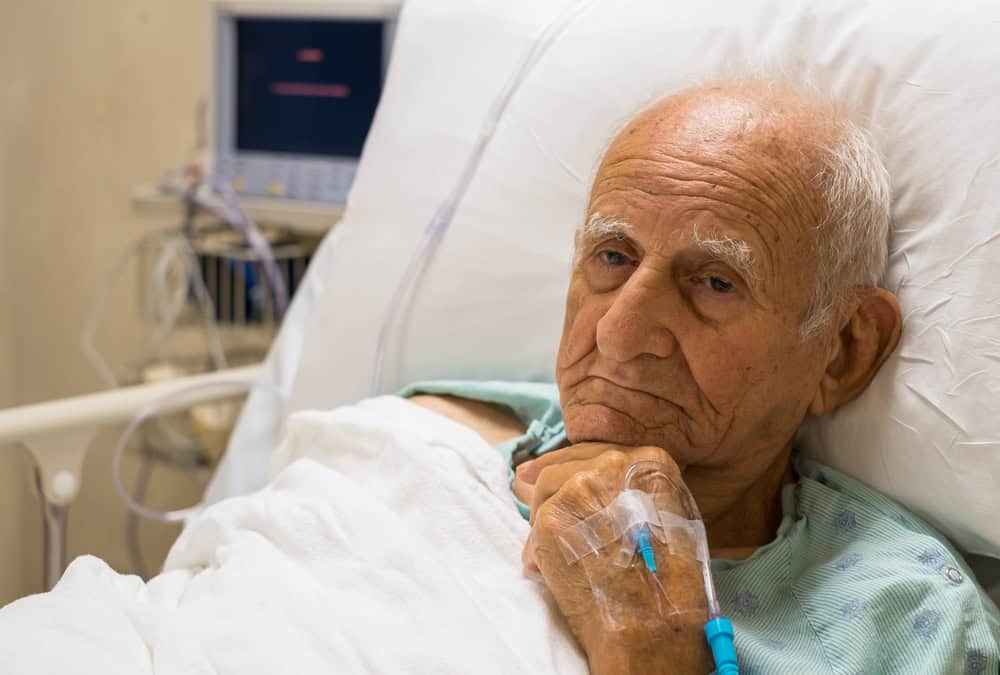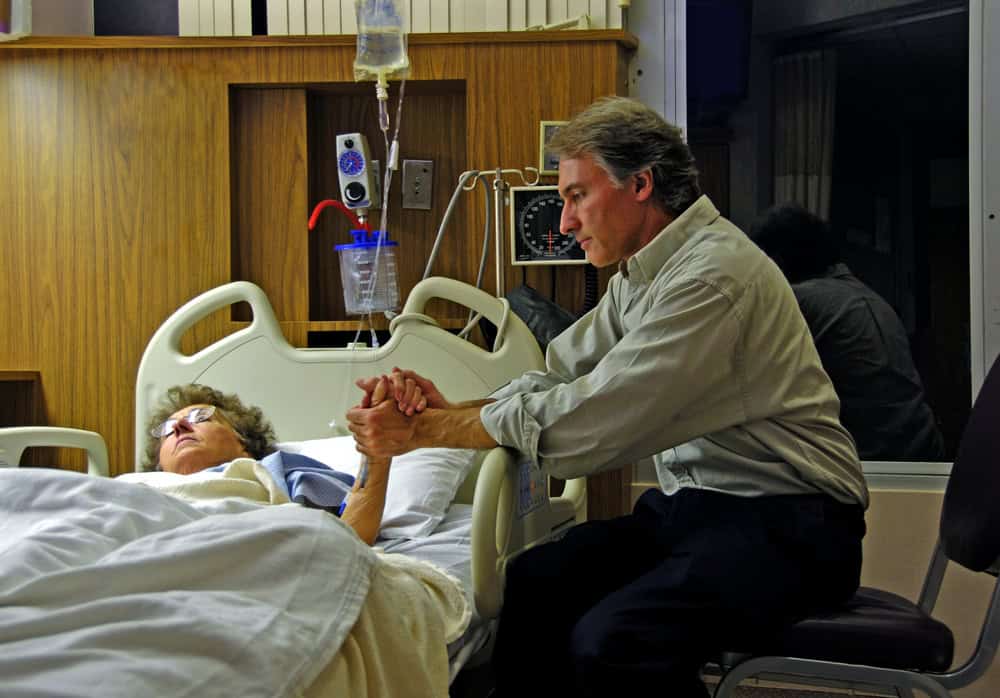It can be traumatizing and scary to process your loved one’s imminent death. Sometimes, this fear will get in the way of knowing the right things to do during this challenging time.
You may only be able to provide the support your loved one requires if you know what to do, what they want, or even what to say.
You need to understand the cognitive, physical, spiritual, and emotional changes occurring during the last stages of your loved one’s illness. By doing this, you will be better prepared and know how to handle approaching death.
Hospice care is ideal for patients in the last stages of their illness — when curative treatment has stopped and is no longer effective. Hospice care is the best option as it ensures your loved one spends their last days in reduced pain and comfort.
Unlike curative treatments, hospice care focuses on providing support and ensuring a patient’s quality of life remains the same or improves on it.
The duration of the dying process will vary from one person to another, and your loved one’s symptoms may differ from others. However, some common signs may act as a guide.
This article explains some typical signs and symptoms to look out for when your loved one shows hospice signs of dying.
Understanding the End-of-Life Process
The end-of-life process usually begins way before the actual death takes place. There are some stages of dying that your loved one will have to go through before death. This could be hours before death, weeks before death, or in the last few days of life.
During this time, it is essential to be well-tuned to your loved one’s mental, emotional, and physical changes, as they will guide and help you recognize when death is near.
The dying process is like a journey with several milestones before the last stop. However, these milestones follow a different chronological order. Your loved one may follow all of them or sometimes skip some.
Stages Before Death and Phases of Dying
Like living, dying is a sacred part of life filled with different roles and tasks. Despite knowing death is inevitable, the process of dying can be traumatizing and unfamiliar to most people.
Each person’s dying is unique as their life has been. The dying process may take hours, days, or even weeks. You must be careful to note the changes accompanying your loved one’s timeline.
Physical Aspects
When a person is dying, they may experience discomfort from various sources. You need to identify the source of their discomfort and address it.
Ask your loved one’s hospice care team to help you identify these sources and how to address them. Some of the sources of discomfort during the dying process are:
Pain
Some people do not experience pain during their last stages of illness. But for those who experience excruciating pain, the hospice care team focuses on relieving pain. You may worry about long-term strong pain reliever dependence, but for a dying person, this isn’t the case.
When a person is struggling with excruciating pain, they may be short-tempered and angry. This can take a toll on them and their caregivers. It will also be challenging to communicate with your loved one when they are angry and short-tempered.
Having a hospice care team create a pain management strategy will significantly help. Pain relief gives your loved one comfort from the pain and allows you to have enough time to say goodbyes and listen to your loved one’s final wishes.
Knowing the level of pain your loved one is experiencing can be difficult, but you can look out for signs like irritation, increased agitation, troubled sleep, and crying.
Remember to always give your loved one their pain medications according to their doctor’s prescription. When you notice the medication wearing off quickly, inform their doctor.
Breathing Problems
During the dying process, your loved one may experience difficulty breathing or shortness of breath. Doctors refer to this condition as dyspnea.
Sometimes, you may notice your loved one having an abnormal breathing pattern. This abnormal breathing pattern usually alternates between deep, shallow, and heavy breathing.
You may also note noisy breathing during this stage, which can be alarming.
To help your loved one experiencing dyspnea, you can
- Try raising their head from the bed,
- Use a humidifier,
- Use a fan to circulate air in their room,
- Open a window.
You can also talk with your loved one’s hospice care team and find out if medications can help ease their breath.
Skin Irritation and changes
When a person is near death, their skin may experience irritation such as itching. Your loved one may become pale, and appear white.
You can assist your loved one by cleaning and moisturizing their skin. You can help your loved one to keep moist and avoid dryness by:
- Applying alcohol-free lotion
- Apply lip balm on their dry lips
- Clean their mouth with a soft and damp piece of clothing
- Place a wet cloth on their closed eyes
- Turn your loved one after a few hours to prevent stiffness and bed sores.
Digestive Problems
When a person is at the end of their life, they might face digestive issues like loss of appetite, nausea, vomiting, and constipation. At other times, they may have difficulty swallowing.
The cause of the digestive issues varies, and you will have to talk with your loved one’s doctor to see if something can be done. Some medications can help with digestive problems and offer comfort during this stage.

Fatigue
Your loved one will have little energy and tire more quickly as the end draws near. You can help them conserve energy by keeping things simple.
For example, they can have a bedside commode in their room as this will save them from going to the bathroom. You can also help your loved one with a sponge bath, or let them sit on a stool while they shower.
Emotional Aspect During the Dying Process
During the final stages before death, a person may fear the unknown, worry about the welfare of those they will leave behind, and be anxious and depressed about their imminent death.
Emotional suffering can be painful, and you may need the intervention of a counselor, one who is familiar with an end-of-life crisis. It’s also crucial to talk about your feelings and let your loved one do the same.
To help your loved one manage their emotions, you can
- Set a serene mood
- Gently massage your them
- Ensure the room has soft lighting
- Play their favorite songs but on low volume
- Be present
- Engage your loved one in small talk; let them tell you what they want
- Read to them a book on a topic that interests them
Spiritual Aspects Of Dying
As your loved one nears the end of life, their spiritual needs are as important as their physical and mental needs. They may want to find meaning in their lives, end any family disagreements, and simultaneously make peace with their situations.
A visiting social worker, chaplain, or volunteer will significantly help your loved one with their spirituality. During this phase, your loved one may find comfort in their faith and beliefs. Sometimes, they may want to listen to their favorite songs, read religious books, or have their spiritual leader visit them.
Talking with your loved one about their impact on your life is essential. Let them know you will value and treasure their input in your life. This will help them know you will be fine even in their absence. Spend time reminiscing about fond memories, as this will help your loved one find peace as their death draws closer.
Common Signs and Symptoms that Indicate Death is Near
Some of the common signs you will notice indicating your loved one’s imminent death include:
- Sleeping more
- Pain
- hallucinations
- Change in appetite where they will eat and drink less
- Weakening of their muscles
- A change in their vital signs
- Social withdrawal
- Increased confusion
- Irregular bowel movements
- Temperature drop
- Breathing problems
- Skin color change

End-of-life Care and Hospice Support
Your loved one will require hospice or end-of-life care as they near their end. They will receive these services from a team of healthcare professionals whose primary focus is ensuring your loved one is comfortable.
This team usually uses a holistic approach in its care, which addresses a patient’s physical, emotional, spiritual, and social support.
Additionally, the team helps the family with counseling, resources, respite care, and any other type of support. With the help of a hospice care team, your loved one will spend their final days in comfort, retain their dignity, and have the necessary support.
Services Offered by Hospice Teams to Ensure a Peaceful End-of-life Experience
Some of the hospice care services that you and your loved one will enjoy include the following:
- Personal care
- Medical care
- Medical equipment and supplies
- Respite care
- Nutrition and dietary assistance
- Occupational and speech therapy
- Social work services
- Grief support
- Counseling
- Care coordination
- Help in navigating hospice care
- Assisting the family with resources and paperwork
- Emotional and spiritual counseling

Importance of Open Communication and Collaboration with Hospice Providers
Open communication and collaboration among hospice care teams are essential as each member plays a crucial role. For effective care, the hospice team has to trust each other and respect each member’s opinion.
To make this a reality, the team members regularly meet to evaluate the effectiveness of their care and come up with ways to ensure their patients are comfortable and pain-free during the last stages of their illness.
Coping with Grief and Loss
Although death is part of life, it still shocks and shakes the people left behind. Coping with grief from the loss of your elderly loved one may be difficult to manage. You may be overcome with confusion, anger, and depression, and this can lead to prolonged periods of grieving and depression.
It’s essential to grieve for your loss as this will help you to overcome the sorrow and maintain a semblance of normality even with your loss. With time, the intensity of this grief and sadness will diminish.
There is no manual to follow when grieving the loss of a loved one. Apply any coping mechanism that doesn’t harm you. A grief counselor from the hospice team will help you process and manage your grief. Research shows that a person will recover from their loss with time if they maintain their social circles and habits.
Coping Strategies and Ways to Support Both the Patient and Caregivers During this Challenging Time
There is no ironclad way to deal with grief, but there are some coping strategies that you can apply as you try to come to grips with your loss. They include:
- Counseling
- Therapy
- Medications
- Family support
- Attending family functions like funeral
- Join online support groups
- Reading your favorite books
- Listening to music
- Watching movies
- Taking a walk with your dog
- Immersing yourself in your hobbies

Conclusion
One gift you can have in this life is the time you spend with your loved one.
When it comes to death, no preparation, knowledge, or plans will substitute your pain. If possible, you would want your loved one to live long and have enough time in this world with them. As this is impossible, all you can do is accept the little time you have and make the most of it.
To help you cope with a loved one’s death, you need to know the signs indicating their end is near. Knowing hospice signs of dying will help you be prepared to assist your loved one. You will also have time to create memories of how you would want to remember your loved ones after they are gone.
Navigating the end-of-life journey will take a toll on you and your loved one. Ensure your loved one receives excellent care during this time, which is essential. Hospice care ensures you get ample time with your loved one. It also gives your loved one time to reflect on their lives, make amends, and make final arrangements.
At Amy’s Ede Senior Care, we can help you prepare for the inevitable. Our dedicated caregivers can help you and your loved one navigate the challenges of the dying process. Don’t hesitate to call us today to learn more about our end-of-life care services.






